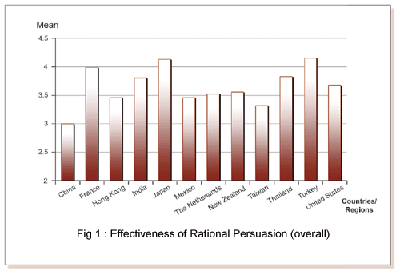Exploring Cross-cultural
Managerial Behaviour
¡@
Exploring Cross-cultural Managerial Behaviour
| |
|
What are the similarities and differences in the use of
influence tactics across cultures? From a management point of view, this is a
practical subject, on which only limited research has been conducted. Prof. Fu
Ping-ping of the Department of Management embarked on a project in 1996 to
explore the relationship between influence tactics and culture. She discovered
that despite the significant cultural differences between the US and China,
there are many similarities in managerial influence behaviour in the two places.
In 1999 she was awarded HK$434,000 by the Research Grants Council to further her
studies on the subject.
|
||||||||||||||||||||||||||||||||||||||||||||||||||||||||
| Evidence-based Research | ||||||||||||||||||||||||||||||||||||||||||||||||||||||||
|
Prof. Fu solicited the help of 10 researchers from tertiary institutions in Europe, North America, Asia, and Latin America to conduct a questionnaire survey on influence tactics in the workplace, which involved some 1,700 middle- and lower-level managers in the telecommunications, finance, and service industries of 12 cultural regions (Table 1). Using her previous research on US and China as a blueprint, Prof. Fu and her partners developed six work scenarios managers commonly encounter, in which the other party is respectively a superior, a coworker, and a subordinate. The scenarios include requiring a subordinate to take on additional or unwelcome work, seeking assistance from coworkers of the same grade, and requesting a superior to increase the budget and approve a new project. She also listed 16 tactics that can be used to influence or persuade, and asked the participants to rate the effectiveness of each tactic in the different scenarios. To find out whether factors besides culture have any influence on the behaviour of office workers, she included questions on personal convictions in the questionnaire. She said, 'Social values are different cross-culturally while personal inclination and beliefs are not. 'The respondents had to give their views on such beliefs, including 'when there's a will, there's a way', 'power corrupts', 'religious beliefs help produce good citizens' ¡@ |
||||||||||||||||||||||||||||||||||||||||||||||||||||||||
¡@ |
||||||||||||||||||||||||||||||||||||||||||||||||||||||||
|
Prof. Fu grouped the 16 tactics under three broad categories: rational persuasion (giving justification for work and the benefits that will entail), exerting pressure (seeking support from a higher authority, threats of resignation, etc.), and socializing (giving gifts, buying meals). Preliminary analyses show that rational persuasion received high effectiveness ratings in all cultures, though to varying extents (Fig 1). ¡@ | ||||||||||||||||||||||||||||||||||||||||||||||||||||||||

The effectiveness of rational persuasion is also found to be dependent on the target (Fig 2). For example, mainlanders tend to use rational persuasion more when dealing with superiors and less with subordinates.
An interesting finding of the survey is that personal beliefs are found to exert considerable influence on the tactics used. For example, respondents who believe in pre-destination tend not to use the art of persuasion on other people. They also tend to be more passive in their tactics. Conversely, those who believe in their ability to control the future are more positive. And those who deem inter-personal relationships important like to use socializing tactics. Prof. Fu and her partners are carefully analysing the data to find out the reasons for such differences, in order to fine-tune theories on managerial effectiveness. ¡@ | ||||||||||||||||||||||||||||||||||||||||||||||||||||||||
| Top | ||||||||||||||||||||||||||||||||||||||||||||||||||||||||
|
Prof. Fu says that the greatest difficulty lies in the cross-cultural nature of the research. Because of time and budget constraints, she was unable to go to different parts of the world to conduct the survey herself. 'I could only take care of the surveys for Hong Kong and mainland China. For other parts, I had to rely on researchers overseas. As it was up to them to decide whether to take part in this project, the current cultural regions covered by the project aren't entirely my first choices.' She also points out that this reliance on overseas assistance makes it difficult to control the progress of the research. Although all the questionnaires were supposed to be returned by November 2000, some were not submitted until July this year. ¡@ | ||||||||||||||||||||||||||||||||||||||||||||||||||||||||
|
Prof. Fu believes that the findings of this pilot study are useful for cross-cultural training. 'If management trainers can provide more information on the tactics preferences of different cultures and the links between personal beliefs and managerial conduct, trainees can increase performance efficiency by choosing the right influence tactics to adopt. This is especially beneficial for companies which have employees coming from different cultural backgrounds.' Prof. Fu also points out that there are many areas worth further investigation. For example, more English-speaking cultural regions can be included in the survey to enable more quantitative and systematic analyses, and the exploration of the interrelationships between culture, personal beliefs, and managerial behaviour. ¡@ | ||||||||||||||||||||||||||||||||||||||||||||||||||||||||
|
| ||||||||||||||||||||||||||||||||||||||||||||||||||||||||